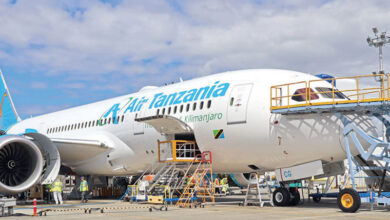Africa Rising: Pioneering Sustainable Aviation
A Green Revolution Takes Root on the African Continent

By Sajedah Rustom, Steve Duley, and Patrick Edmond
Africa, continent rich in resources and potential, is at the forefront of a green revolution, embracing sustainable practices across various sectors. One of the most exciting and impactful trends is the rise of sustainable aviation. Over the next few minutes, let’s explore the key drivers behind this shift and highlight the unique opportunities Africa presents in leading the charge towards a more sustainable future in aviation.
Harnessing Nature’s Bounty
Africa’s abundant renewable resources such as solar, wind, and hydroelectric power are pivotal in its move towards sustainability. The continent is increasingly tapping into these sources to reduce reliance on fossil fuels and combat climate change.
This shift is not only beneficial for the environment but also positions Africa as a potential powerhouse in sustainable fuel production. As Patrick Edmond, Managing Director of Altair Advisory, notes, “Africa has huge potential to develop its commercial aviation sector, and this can go hand in hand with the development of indigenous sustainable aviation fuel production to reduce costs for African airlines, provide an extra revenue stream for African fuel suppliers and airports selling sustainable fuel to non-African airlines flying in, and demonstrate an indigenous African solution to global sustainability challenges.”
Building Green Cities
Urban development in Africa is evolving with a focus on sustainability. Green infrastructure projects, including eco-friendly buildings, sustainable transportation systems, and innovative waste management solutions, are transforming cityscapes. These developments not only reduce environmental impact but also promote responsible growth. By integrating sustainable practices into urban planning, African cities are setting a precedent for environmentally conscious development.
Protecting Precious Heritage
Conservation efforts across Africa are gaining momentum. Establishing protected areas, fostering community-based conservation initiatives, and implementing sustainable agricultural practices are crucial for preserving ecosystems, wildlife habitats, and biodiversity. These measures are essential for maintaining the natural beauty and ecological balance that Africa is renowned for.
Embracing the Circular Economy
Africa is increasingly adopting the principles of a circular economy, which focuses on minimizing waste and maximizing resource efficiency. Innovative recycling and upcycling programs, along with business models that prioritize reuse and repair, are being embraced. This approach not only reduces environmental impact but also creates new economic opportunities and extends the lifecycle of resources.
Sustainable Agriculture
Agriculture remains a cornerstone of many African economies. There is a growing shift towards sustainable farming practices such as organic farming, agroforestry, and water-efficient irrigation techniques. These methods enhance food security, mitigate climate change effects, and protect soil health, ensuring that agriculture can continue to thrive in a changing climate.
Building Climate Resilience
Climate change poses significant threats to Africa, but nations are not standing idly by. Efforts to build resilience to extreme weather events and rising sea levels are underway. This includes implementing climate-smart infrastructure, developing early warning systems, and strengthening community-based adaptation strategies. These measures are critical for safeguarding communities and ensuring long-term sustainability.
Financing a Sustainable Future
Green finance is emerging as a game-changer in Africa. Public and private sector actors are collaborating to invest in renewable energy, conservation initiatives, sustainable agriculture, and climate resilience efforts.
The aviation sector, in particular, stands to benefit from this trend. The growing global demand for sustainable aviation fuel (SAF) has opened new avenues for investment. According to a Reuters report, the European Union is scouting Africa for clean jet fuel projects under its Global Gateway infrastructure fund. This initiative could significantly boost Africa’s role in the global sustainable aviation market.
Technology and Innovation
Technological advancements are playing a crucial role in addressing sustainability challenges in Africa. Mobile applications, Internet of Things (IoT) devices, and data analytics are being leveraged to improve energy access, water management, and environmental monitoring. These innovations are driving efficiency and effectiveness in various sectors, contributing to the overall sustainability movement.
A Youth-Led Movement
Africa’s youth are at the forefront of the sustainability movement. Young leaders and grassroots organizations are advocating for environmental conservation, climate action, and social justice. Their efforts are raising awareness and mobilizing action on critical sustainability issues, driving change from the ground up.
Policy and Governance
Governments across Africa are enacting policies and regulatory frameworks to support sustainable development goals. Commitments to reduce carbon emissions, protect natural resources, and promote inclusive growth are being established. However, effective implementation and enforcement remain challenges that need to be addressed to ensure long-term success.
The Future of Sustainable Aviation in Africa
The future of sustainable aviation in Africa looks promising. Altair’s Patrick Edmond highlights the significant potential for growth: “The number of flights the average person takes in a year is much higher in the Global North. For its size and population, air traffic in Africa is still very low, and its potential is still unrealised”.
According to Mr Edmond, “sustainable aviation may therefore become a hot topic in Africa some years after Europe, but the fact that sustainable aviation fuel production can be a new revenue source for African firms and countries may speed up awareness that sustainability is not just a challenge but also an opportunity.”
By harnessing its vast resources, embracing innovation, and empowering its youth, Africa is well on its way to achieving a future that is environmentally sound, economically vibrant, and socially just. The rise of sustainable aviation on the continent is a testament to this commitment and serves as an inspiration for the rest of the world to follow. As we look to the future, Africa’s example shows us that with determination and collaboration, a more sustainable aviation industry — and a more sustainable world — is within our reach.
About the authors:
Sajedah Rustom is the Chief Executive Officer of AviaPro Consulting, a global boutique aviation consultancy offering solutions in Aviation Strategy and Operations Consulting, Technical and Engineering Services, Training and Development, and Aviation Analytics and Technology Solutions.
Steve Duley is a highly experienced aerospace veteran with a background in aerospace defence and commercial aviation. Based in Johannesburg, he currently serves as AviaPro Consulting’s Business Development Executive in charge of Africa.
Patrick Edmond is the leader of Altair Advisory, where he uses his over twenty years of leadership experience in the aviation sector to help airlines achieve efficiency, profitability and sustainability.





